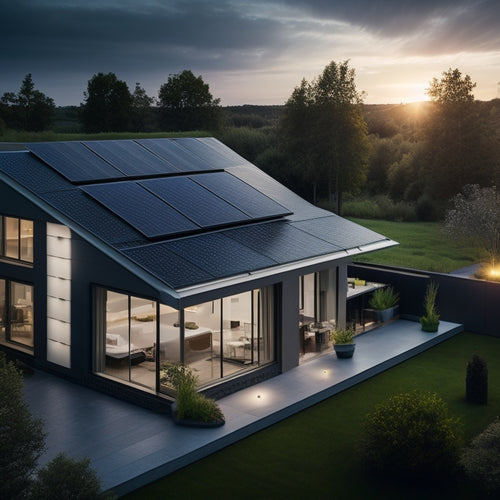
Heat Your Home With Renewable Energy Solutions
Share
You can heat your home efficiently with renewable energy solutions, reducing your reliance on fossil fuels and minimizing your environmental impact. Solar thermal collectors, for instance, can provide up to 80% of your water heating needs. By utilizing solar power, you can create a sustainable home heating system that warms your living spaces and water. From solar water heating to radiant floor heating options, there are various innovative solutions available. Each option offers unique benefits, such as energy independence and cost savings. As you investigate these solutions, you'll uncover the many ways to create a cozy, eco-friendly home that's perfect for you.
Overview
- Solar space heating systems utilize solar energy to warm living spaces, reducing fossil fuel dependency and promoting energy independence.
- Radiant floor heating options, including electric and hydronic systems, provide comfort and reduce reliance on fossil fuels for home warmth.
- Solar thermal collectors convert sunlight into heat for water or space heating, offering a sustainable alternative to traditional heating methods.
- Advanced MPPT technology and tracking systems enhance peak energy capture, maximizing the efficiency of solar panels for home heating.
- Properly sized and oriented solar panels, combined with optimal roof size and angle, can significantly reduce energy expenses and environmental impact.
Harnessing Solar Power Efficiency
When it comes to utilizing solar power efficiency for home heating, your roof becomes a prime asset. You can exploit the sun's energy by installing solar panels, which convert sunlight into electrical energy through photovoltaic technology.
With high-efficiency solutions that maximize energy harvest, utilizing advanced MPPT technology for peak energy capture high-efficiency solutions becomes essential.
To maximize solar panel efficiency, consider the size and angle of your roof, as well as the local building codes and regulations. Verify your solar panels are installed at an ideal angle to capture the most sunlight, and consider using a tracking system to adjust the panels' position throughout the day.
Benefits of Solar Water Heating
Your solar-powered home heating system can be further improved by incorporating solar water heating. This technology utilizes the sun's energy to heat your water, providing a reliable and efficient way to reduce your energy bills.
By installing a solar water heater, you can enjoy significant cost savings, as it can reduce your water heating expenses by up to 80%. Furthermore, solar water heating has a minimal environmental impact, as it produces no emissions or pollution, making it an attractive option for those seeking a cleaner and more sustainable way to heat their water.
Additionally, solar energy integration guarantees energy independence reducing fossil fuel dependence and supports a renewable future. With a solar water heater, you can enjoy a hot shower while knowing you're doing your part for the planet.
Solar Space Heating Systems
Often, homeowners overlook a crucial aspect of solar-powered home heating: solar space heating systems. These systems utilize solar energy to warm your living space, reducing your reliance on fossil fuels.
By incorporating solar heating innovations into your home's design, you can create a more sustainable and self-sufficient living environment. Additionally, energy-efficient designs and sustainable building practices Energy Efficient Smart Thermostats can further enhance the overall energy efficiency of your home.
Solar space heating systems work by circulating a fluid through solar collectors, which then transfer the heat to your home. This can be achieved through passive solar design, where your home's structure is optimized to absorb and retain natural heat.
Radiant Floor Heating Options
Two types of radiant floor heating options are available for homeowners looking to upgrade their heating systems: electric and hydronic.
You can choose electric radiant floor heating, which involves installing heating elements, such as mats or cables, under your flooring. This option is often more cost-effective and easier to install, especially in smaller areas.
On the other hand, hydronic systems circulate hot water through pipes under your floor, providing a more efficient and cost-effective solution for larger spaces.
Both options offer the comfort and efficiency of radiant floor heating, allowing you to enjoy a warm and cozy home while reducing your reliance on fossil fuels.
Solar Thermal Collectors Explained
Most homes can accommodate solar thermal collectors, which convert sunlight into heat energy for water or space heating. You'll need to evaluate the type of solar collector that suits your needs. There are two main types: flat-plate collectors and evacuated tube collectors.
| Solar Collector Type | Description |
|---|---|
| Flat-Plate Collectors | Glazed flat plates with tubes containing fluid to absorb heat |
| Evacuated Tube Collectors | Vacuum-sealed tubes with fluid to minimize heat loss |
| Unglazed Collectors | Low-cost, low-efficiency collectors for mild climates |
| Concentrating Collectors | Reflectors or lenses to focus sunlight for high-temperature applications |
| Hybrid Collectors | Combines photovoltaic cells with thermal collectors for electricity and heat |
When installing solar thermal collectors, evaluate the roof's size, orientation, and shading. Verify the system is properly sized for your heating needs and insulated to minimize heat loss.
Frequently Asked Questions
Can I Install Renewable Energy Systems Myself to Save Money?
You can attempt a DIY installation to save money, but consider your technical knowledge and local building codes; improper installation may void warranties or compromise system efficiency, potentially offsetting cost savings.
Are Government Incentives Available for Renewable Energy Upgrades?
"Don't count your chickens before they hatch," but you can count on government incentives for renewable energy upgrades. You'll find federal tax credits, state rebates, energy efficiency programs, and installation grants to offset costs, giving you the freedom to go green without breaking the bank.
How Do I Determine the Best Renewable Energy Solution for My Home?
To determine the best renewable energy solution for your home, you'll assess your location's solar panel efficiency and wind energy potential, then evaluate your energy needs and budget to select the most suitable option for your independence.
Can I Use a Combination of Renewable Energy Sources for My Home?
You can combine different renewable energy sources to power your home, exploring solar hybrid systems and wind solar integration to optimize energy output, reduce costs, and increase your independence from the grid.
Will Renewable Energy Systems Increase My Home's Resale Value?
You'll likely see an increase in your home's resale value when you invest in renewable energy systems, as they enhance energy efficiency, reducing energy costs and appealing to eco-conscious buyers who value sustainable living.
Ready to Buy
As you consider heating your home with renewable energy, remember that solar power is like a golden thread weaving together efficiency, cost-effectiveness, and sustainability. By utilizing solar energy, you can reduce your reliance on fossil fuels and lower your carbon footprint. From solar water heating to radiant floor heating options, the possibilities are endless. With the right system, you can bask in the warmth of a renewable energy-powered home, just like a sun-kissed field of wheat soaking up the sun's rays.
Related Posts
-

Sustainable and Eco-Friendly Generators for a Reduced Carbon Footprint
Sustainable and eco-friendly generators are perfect for cutting your carbon footprint and increasing energy efficienc...
-

Advantages of Solar Generating Systems Over Traditional Energy
Solar generating systems provide several key advantages over traditional energy sources. You'll experience lower long...
-

Home Solar Battery
You're opting for a home solar battery that allows you to utilize the power of the sun during the day and use it at n...


